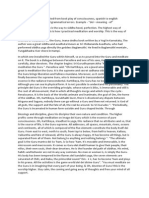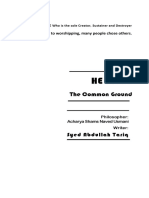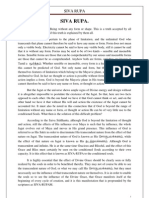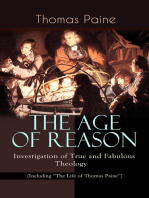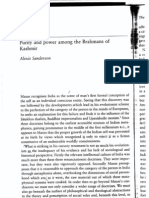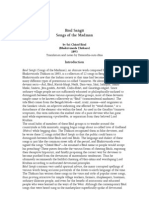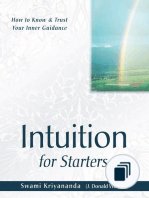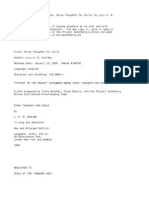Universal Relevance: of Guru Granth Sahib
Universal Relevance: of Guru Granth Sahib
Uploaded by
ਸਤਵੰਤ ਸਿੰਘ ਖਾਲਸਾCopyright:
Available Formats
Universal Relevance: of Guru Granth Sahib
Universal Relevance: of Guru Granth Sahib
Uploaded by
ਸਤਵੰਤ ਸਿੰਘ ਖਾਲਸਾOriginal Title
Copyright
Available Formats
Share this document
Did you find this document useful?
Is this content inappropriate?
Copyright:
Available Formats
Universal Relevance: of Guru Granth Sahib
Universal Relevance: of Guru Granth Sahib
Uploaded by
ਸਤਵੰਤ ਸਿੰਘ ਖਾਲਸਾCopyright:
Available Formats
of Guru Granth Sahib
By Col (Dr) Dalvinder Singh Grewal
Universal Relevance
(From the One and the same Light, the entire universe came into existence. How can there be good or bad among them?)
Awal Allah noor upaaia kudrat ke sab bande Eik noor te sab jag upjeya kaun bhale ko mande. (1349)
I have studied the scriptures of great religions, but I do not find elsewhere the same power of appeal to the heart and mind as I find in these volumes (of Sri Guru Granth Sahib ). - Pearl S. Buck, Noble Laureate In the coming religious debate, the Sikh religion and its scripture, Guru Granth, will have something special of value to say to the rest of the world. - Arnold Toynbee, historian It would rank almost first in the world. Of no other religion can it be said that it has made a nation in so short a time. - Dorothy Field
n 10 December 1948, UNO General Assembly passed resolution No. 217-A on human rights stating, All human beings are born free and equal in dignity and rights. They are endowed with reason and conscience and should act towards one another in a spirit of brotherhood.
Sri Guru Granth Sahib, the Supreme Sikh Scripture, already preaches all this vehemently and in much clearer and stronger terms. Guru Nanak had declared in sixteenth century:
(The Divine Light is within everyone; It is that Light which shines within everyone.)
Sab meh jyot jyot hai soye Tis de chanan sab meh chanan hoye. (663)
Guru Nanak considered everyone else better than himself. He gave them the same respect and regard as he considered all having been created by the same God, whose light enlivened all His creation. For him, no one was lowly:
(The clay is the same. He only fashioned it in various ways. There is nothing wrong with the pot of clay nor with the Potter. The True Lord abides in all; by His making, everything is made. Whoever realizes the Order of His Command, knows the One Lord. He alone is said to be the Lord's true servant. The Lord Allah is Unseen; He cannot be seen. The Guru has blessed me with this sweet molasses of God's Knowledge, says Kabir, so much so that my anxiety and fear have been taken away and I see the Immaculate Lord pervading everywhere.)
Maati eik aneik bhaant kar saaji saajanhaarey Na kachh poch maatee ke bhaandei na kachh poch kumbhaarei. Sabh meh sacha eiko soee tis ka keeya sab kachh hoee Hukam pachhanei su eiko jaanei bandaa kahee-e-i soee Allaah alakh na jaaee lakhia gur gurh deena meethaa Keh Kabir meri sanka naasee sarab niranjan deethaa (1350)
(Call everyone exalted; no one seems lowly. The One Lord has fashioned the vessels (human bodies) and One Light pervades in the three worlds.)
Sab kau oochaa aakheeai neech naa deesai koye Iknai bhaand saajiai ik chaanan tih loye. (62)
This was the time when caste and religious inequalities were barbaric and humiliation of the downtrodden through subjugation was at its extreme. Guru Nanak and all those, whose verses appear in Guru Granth Sahib, spoke against this openly, even though they had to face opposition and ridicule not only from the ruling and upper class but also from their own people. The second Guru, Angad Dev put this ideal into practice through Pangat and Sangat, where people from all castes and creeds used to sit together to have Langar and meditated and listened to Gurbani together in Sangat. This practice continues till date. The fourth Guru, Ram Das sang in the Sangat:
(Same air, same earth and the same light of God is in one and all.)
In the same century Kabir explained this by saying:
(From the One and the same Light, the entire universe came into existence. How can there be good or bad among them?)
Awal Allah noor upaaia kudrat ke sab bande Eik noor te sab jag upjeya kaun bhale ko mande. (1349)
Eiko pawan maati sab eika sab eka jyot sabhaeeya (969)
He asked the people not to get assailed by doubt. The Creation is in the Creator and the Creator is in the Creation, totally permeating all places:
Guru Arjan, the fifth Guru emphasized this further by saying:
(Our Guru has removed all the doubt from our minds. There is only one Allah or Parbrahm.)
Kahau Nanak Gur khoye bharam eiko Alhau Parbhahm (897)
All human beings have the same religion. He repeated Guru Nanak's words saying:
(All humans form a common fellowship. O Lord! You are alien to no one.)
Sabhai Saanjhiwal Saddaa-in tu kisse naa dissai bahraa jeeo (97)
I am not a Hindu, nor am I a Muslim. My body and breath of life belong to Allah, to Ram - the God of both.)
Naa ham Hindu naa Musalmaan Allah Ram ke pind pran (1136)
Guru Arjan submits:
Everywhere unicity of God is emphasized. It was really a daring feat at the time when the rulers of the time, the Qazis used to get inflamed with such statements and awarded death punishment to infidels, who dared to equate Allah with Ram. Their Allah was considered to be superior to Ram, as they were from the ruling elite. As a result, Guru Arjan, the fifth Guru had to face the harshest punishment of bearing the pouring of burning sand over his head while sitting on a hot iron plate on an oven on one of the hottest summer days of June. When the Muslim saint Mian Mir saw this he was enraged. He wanted to curse the perpetrators of this punishment, but the Guru restrained him from losing calm:
(Your Order is the sweetest O Lord. I pray that You give me Your Divine Naam for recitation.)
Tera keeya meetha laage har Naam padarath Nanak mange (394)
This was the terminal level of tolerance. The Gurus considered even their purported executioners as innocent since they were acting on the orders of God. If we compare the contents of the UNO resolution with the actions of the Gurus and their words recorded in Guru Granth Sahib we find that the resolutions are the preliminary steps towards human rights, which the Gurus considered most valuable. Even the person on call for duty to murder had the right to live. So say these hymns. This was precisely the very reason that led Prof R.L. Bradshaw to believe: 'The Sikh Religion is a universal world faith, a message for all men. This is amply illustrated in the writings of the Gurus. Sikhs must cease to think of their faith as just another good religion and must begin to think in terms of Sikh religion being the religion for this New Age
Those who were administering the punishment were working as per order of the rulers and he was bearing the punishment as per God's order; there was none working against God's order hence all were within the same order:
(There is no enemy or other one as I have equal affection for all.)
Naa ko bairi nahi bigaana sagal sang ham ko ban aayee (1299)
This fact is already recorded in Guru Granth Sahib:
(What ever the enlightened souls speak is meant for the entire world.)
Parthaye saakhi maha purkh bolde sanjhi sagal jahane (647)
They do not think of one person, community, society, religion, country, or age. They think well of all the societies for all the ages to come. They pray for all to be salvaged from the burning pyre of the worldly maya, which is a complex outcome of the interaction of kaam, karodh, lobh, moh and ahankaar. They pray for God's forgiveness and blessings on all the beings and to provide food and shelter to all to remove their sufferings:
On 10 December 1948, UNO General Assembly passed resolution No. 217-A on human rights stating, All human beings are born free and equal in dignity and rights. They are endowed with reason and conscience and should act towards one another in a spirit of brotherhood.
Guru Granth Sahib, the Supreme Sikh Scripture,
(O Lord! the world is in flames, save it by thy grace. Through whichever way it can be delivered, deliver it that way.)
Jagat jalanda rakh lei apni kirpa dhaar Jitt duarey ubhreh titte leho ubhaar. (853)
At that time India was badly divided into castes. The upper castes treated the lower castes as slaves, who were virtually in bondage. Their bonded life was made all the more horrible by continuous indignities being heaped upon them. There was no way out as there was none to help them out of this situation. Whosoever tried to speak and stand for their problems, was castigated and made to face the wrath of the upper castes. But the Gurus and the saints of Guru Granth Sahib refused to accept these man-made distinctions. Guru Arjan considered:
already preaches all this vehemently and in much clearer and stronger terms. Guru Nanak had declared in sixteenth century: Sab meh jyot jyot hai soye (663)
The Gurus and saints loved and made friendship with all high and low and treated all as equals since all belong to God:
(I have befriended all and am a friend of everyone.)
Sabh ko meet ham aapan keenaa Ham sabhnaa ke saajan (671)
(All beings are parts of the God and the God is the part of His creation. Everything is one without doubt.)
Braham meh jan jan meh Parbraham Eikeh aap naheen kachh bharam (287)
They considered truth as the only religion of the universe; the only truth being God:
(If someone grasps that there is one form of righteousness, one should then hold firm the truth.)
Eiko dharam drirai sach koee Gurmat pooraa jug jug soee (1188)
Kabir explained:
(Who has Lord, the highest one, on his side, for him it does not seem graceful to go to another's house.)
Jaako thakur oochaa hoee So jann par ghar jaat naa sohee (330)
They did not consider these Yogis as suitable aspirants of God because they only talked but failed to think of all as equal. The best Yogis in their eyes were those, who regarded all God's creation as equal and acted as such:
Their message was meant for all; the Kshatris, Brahmins, Shudra and Vaish; that those followers of the Gurus who meditate on God's Name will be redeemed; may they be from any caste since there were no caste distinctions in God's domain:
(By mere words, Yoga is not practised. One, who looks upon all mortals with the same eye and deems them all equals, is called a true Yogi.)
Galee jog naa hoee Eik drist kar samsar jaanai jogi kaheeai soee (730)
(All the Kshatris, Brahmins, Shudra and Vaish; all can be redeemed by the same Name of the God. Only those, who worship and meditate on God, cross the ocean of worldly evils, become pure and help their generations to swim across the ocean of worldly evils.)
Khatri Brahman Sood Vaish updesh chahau varnan kau saanjha Gurmukh Naam japei udhrei so kal meh ghatt ghatt Nanak maajha. (748)
Guru Nanak stayed with Lalo, the carpenter and refused to eat the food of the minister Bhago, who considered Lalo to be of low caste and the staying of Nanak with him against the rules of society. Considering this thought as the hub of Guru Granth Sahib the famous scholar Archer endorsed Prof Bradshaw's view saying, The religion of Guru Granth Sahib is a universal and
practical religionthe world today needs its message of peace and love. The peace to the mind and love for the heart emanating through the Gurbani is well acknowledged by the Nobel Laureate Pearl S. Buck in following words: I have studied the scriptures of great religions, but I do not find elsewhere the same power of appeal to the heart and mind as I find in these volumes. They are compact in spite of their length and are a revelation of the vast reach of the human heart, varying from the noble concept of God to the recognition and indeed the insistence upon the practical needs of human body. There is something strangely modern about these scriptures and this puzzled me until I learned that they are comparatively modern, compiled as late as 16th century when explorers were beginning to discover that the globe, upon which we all live, is a single entity divided only by arbitrary lines of our own making. Perhaps this sense of unity is the source of power I find in these volumes. They speak to a person of any religion or of none. They speak for the human heart and the searching mind.
fatherhood of God. So through Guru Granth Sahib flows and glows the salvation of humanity. The Baani of Guru Granth Sahib has the creative force of infinite rhythm. It creates the internal rhythm of the body and that of the being. The power and projection of the sound waves in the Shabads of Guru Granth Sahib are within ragas. These ragas are a methodology of harmonious play of the life force. The blessings of Guru Granth Sahib nurture the trees, human beings, bees and birds, demons and angels alike. Gurbani is a song celestial, which sings the glory of the sole God in one harmonious melody from the beginning to the end. Once honeybees sat on a branch and the tape of the Gurbani was played at a distance constantly. That beehive gave three times the honey compared to other beehives.
Universality of God and monotheism
Guru Granth Sahib's total structure is built on the Oneness of God. It starts with Ik Omkaar i.e., only one God is the creator of the universe. He is neither established nor created by anyone. He has created Himself and created a Name too. This is a fact because He neither dies nor is reborn. He is immortal, ever living, beyond life and death and will continue to be so forever. He fears none as there is none equal to Him and all are His creation and hence subordinate to Him. They all serve as per His Order and according to His Will. Thus He has no enemy or enmity either. One can attain Him only by His Grace. The Lord is independent, limitless and infinite:
Brotherhood of Man
Guru Granth Sahib is the matchless Divine Treasure of synthetic embrace for the whole global community. Guru Granth Sahib is a paradise of spiritual harmony. True integration, harmony and unity can usher in on a solid foundation of love. Love stands out beautifully, harmoniously and synthetically in its positive pristine purity and glory in Guru Granth Sahib, where the hymns celestial of divine lovers of different religions, faith and creed are enshrined in one religion of love in the brotherhood of man and sole
(He can neither be manifested nor created by anyone. He, the pure one, is all-in-all Himself.)
Thaapia naa ja-ai keetaa naa ho-ai Aapai aap Niranjan so-ai (2)
The fact that Omkaar in the Mool Mantra is preceded by Ik shows that, despite the many-ness of the revealed world, its oneness is not lost sight of. The Lord, who created the universe is the sole Master of all. He is monistic in character, though pluralistic in content. Gurbani's belief is that God exists not merely as an idea or concept but as a real being, indescribable but not knowable:
(The unique Lord is Peerless, Immortal, Unborn and without caste and involvement. He is inaccessible, unknowable and has no form or outline. By searching and searching I have seen him in all the hearts.)
Ekam ekamkaar niralaa Amar ajonee jaat naa jaalaa Agam agochar roop naa rekhiaa Khojat khojat ghat ghat dekhiaa (838)
wrote any of his tenets, his writings have not descended to us. We know the teachings of Socrates only through the writings of Plato and Xenophon. Buddha has left no written memorial of his teachings, King Fu-Tzu, known to Europeans as Confucius, left no documents in which he detailed the principles of his moral and social system. The founder of Christianity did not reduce his doctrines to writings and for them we are obliged to trust to the Gospels according to Mathew, Mark, Luke and John. The Arabian Prophet did not himself reduce to writing the chapters of Qur'an. They were written or compiled by his adherents and followers. But the compositions of Sikh Gurus are presented unaltered by copyists and we even become, in time, familiar with their different styles. No spurious compositions or extraneous dogmas can, therefore, be represented as theirs.
Universal Truth
Guru Granth Sahib, thus, is built on total truth. It is a universal truth that everything in the universe is continuously changing Sab jag chalanhaar (468). Anything which changes is false. Only God is the One who remains the same and does not change, hence the dictum is true:
He is prevalent everywhere and in everything i.e., in His creation. Thus the entire universe is His abode. He is settled in it to enjoy His creation. Only those can know the Universe and its parts, who have realized Him through His Word with the guidance of the Guru. His Word can be realized by practicing Truth and self-restraint acting upon Guru's teaching and contemplating over Lord's praises. By Contemplating the True Name, man gets to his own home (man's true home is Lord's abode) and attains the exalted Lord.
Guru Granth Sahib does not talk of many Gods. In fact it is against multiplicity of God:
(True in the primal beginning. True through all ages. True here and now. Nanak says, He shall ever be true.)
Aad sach jugad sach hai bhi sach Nanak hosi bhi sach (1)
God belongs to all and all belong to Him:
Sabna jeeyan ka ik daata (2)
For Nanak there is one God, one soul, indivisible, self existent, incomprehensible, timeless and all-pervading. To be named, but otherwise indescribable and altogether lovely. Such was Nanak's idea of the Creation and was a conception which at once abrogated all petty distinctions of creed, sect, dogma and ceremony. The realization of such a God shatters the sophistries of the theologians and quibblings of dialecticians. It clears the brow from the gloom of abstruse pondering over trifles and leaves the heart free for the exercise of human sympathies. - Fredric Pincot, British Scholar Thus the unicity of God is again and again re-iterated in
Guru Granth Sahib.
(There is only the One, the Giver of all souls.)
And again:
(The Divine Light is within everyone; It is that Light which shines within everyone.)
Sab meh jyot jyot hai soye Tis de chanan sab mein chanan hoye (663)
Authentic and Original
This is how Sikh faith is unique and different from all other religions. M.A. McAuliffe in 'The Sikh Religion - Its Guru, Sacred Writings and Authors' confirming the authenticity and uniqueness of Sikh religion writes: The Sikh religion differs as regards the authenticity of its dogmas from most other great theological systems. Many of the great teachers the world has known, have not left a line of their own composition and we only know what they taught through tradition or second hand information. If Pythagoras
These are some of the examples of truth which abound in the entire Guru Granth Sahib. The entire fabric of Guru Granth Sahib is built around the fabric of truth. This truth is universal and is beyond the boundaries of nations and earths and stars as it is applicable to the entire universe. Prof H.L. Bradshaw states, The other religions contain the truth but Sikh Religion (Guru Granth Sahib) contains the fullness of truth.
Guru Granth Sahib is thus about the universe and for the universe and has the applicability for people from all walks of life globally. This universality needs to be expounded and propagated further so that the message of Guru Granth Sahib reaches all corners of the world, is understood and applied to make the world a better living place.
You might also like
- Getting To Know JestDocument29 pagesGetting To Know JestMahesh VP100% (1)
- Data Visualization MCQ QuestionsDocument13 pagesData Visualization MCQ QuestionsKapil Singh Bisht50% (2)
- Augé OblivionDocument50 pagesAugé OblivionJimmy Medina100% (1)
- Meditation On GuruDocument2 pagesMeditation On Gurubangera23100% (1)
- Skills Assessment - Student Training: (Answer Key)Document18 pagesSkills Assessment - Student Training: (Answer Key)xo4yxaNo ratings yet
- HE AloneDocument37 pagesHE AloneSyed Abdullah TariqNo ratings yet
- Prabuddha Bharata or Awakened IndiaDocument58 pagesPrabuddha Bharata or Awakened Indiaryanw1986No ratings yet
- A Comparative Study of Sabda Vyaparas According To Naiyayikas Mimamsakas and VaiyakaranasDocument264 pagesA Comparative Study of Sabda Vyaparas According To Naiyayikas Mimamsakas and Vaiyakaranasjay gaudani100% (1)
- Siva RupaDocument3 pagesSiva RupaSivasonNo ratings yet
- Opacity: What We Do Not See: A Philosophical Notebook, by Nassim Nicholas TalebDocument115 pagesOpacity: What We Do Not See: A Philosophical Notebook, by Nassim Nicholas TalebraymondnomyarNo ratings yet
- SRINIVASACHARI, P. N. The Philosophy of BhadAbheda The Adyar Library, 1950Document356 pagesSRINIVASACHARI, P. N. The Philosophy of BhadAbheda The Adyar Library, 1950SzurjavarmanNo ratings yet
- SRiMADBHAGAVADGITA WITH GiTARTHA SANGRAHA OF ABHINAVAGUPTADocument368 pagesSRiMADBHAGAVADGITA WITH GiTARTHA SANGRAHA OF ABHINAVAGUPTAseabrafabiano100% (4)
- Unity in Diversity Radhamadhav DasDocument480 pagesUnity in Diversity Radhamadhav DasgurudasaNo ratings yet
- I will Transform you into an Archangel God I will Transform you into an Archangel God Saint Cristel the Archangel Messiah San Cristel Arcangel Messias Saint Acetr444 the Archangel Angel of the Presence Angel of the Divine .docxDocument60 pagesI will Transform you into an Archangel God I will Transform you into an Archangel God Saint Cristel the Archangel Messiah San Cristel Arcangel Messias Saint Acetr444 the Archangel Angel of the Presence Angel of the Divine .docxAce Orense Cupid Uranus Ace Sphinx Galzu Acetr444 son of Multiverses Chaos Gaeia Eros ACETR4440% (1)
- The Agony of Yuga Rishi Shriram Sharma Acharya Regarding The Present Demeaned State of World Human Psyche and SocietyDocument168 pagesThe Agony of Yuga Rishi Shriram Sharma Acharya Regarding The Present Demeaned State of World Human Psyche and SocietyYuga Rishi Shriram Sharma Acharya100% (1)
- Sabda Purva YogaDocument19 pagesSabda Purva Yogasunil sondhi100% (1)
- The Occult Significance of The Bhagavad Gita Lecture 4Document11 pagesThe Occult Significance of The Bhagavad Gita Lecture 4Harish ShridharamurthyNo ratings yet
- SBH 29 - Adhyatma Ramayana - English Translation - Lala Baijnath 1912 PDFDocument236 pagesSBH 29 - Adhyatma Ramayana - English Translation - Lala Baijnath 1912 PDFJoãoMarceloMazzini100% (1)
- The Sikh Religion by Teja Singh MADocument28 pagesThe Sikh Religion by Teja Singh MADavinder Pal Singh100% (1)
- I AM I The Indweller of Your Heart—Book Two: I AM I The Indweller of Your Heart, #2From EverandI AM I The Indweller of Your Heart—Book Two: I AM I The Indweller of Your Heart, #2No ratings yet
- Unit-5 Mimamsa Philosophy PDFDocument12 pagesUnit-5 Mimamsa Philosophy PDFkaustubhrsinghNo ratings yet
- GuruvaniDocument3 pagesGuruvaniShaje UdayabhanuNo ratings yet
- Sabdapurvayoga PDFDocument18 pagesSabdapurvayoga PDFsunil sondhiNo ratings yet
- Sabda Sakti KalakalpaDocument17 pagesSabda Sakti Kalakalpasunil sondhiNo ratings yet
- I AM I The Indweller of Your Heart—'Collection': I AM I The Indweller of Your Heart, #4From EverandI AM I The Indweller of Your Heart—'Collection': I AM I The Indweller of Your Heart, #4No ratings yet
- Words of Shree Anandamayi MaDocument174 pagesWords of Shree Anandamayi MaAshutosh KumarNo ratings yet
- Tätparya-Nirëaya: The Ascertainment of IntentDocument2 pagesTätparya-Nirëaya: The Ascertainment of IntentAtula KrsnaNo ratings yet
- Baul's SongsDocument8 pagesBaul's SongsClaymindNo ratings yet
- Great Saints and Their Mission-Exact TextDocument7 pagesGreat Saints and Their Mission-Exact TextsanjaspahovicNo ratings yet
- The Harvest Is Rich - The Mission of Kirpal Singh, by George Arnsby JonesDocument96 pagesThe Harvest Is Rich - The Mission of Kirpal Singh, by George Arnsby JonesSant Mat100% (1)
- The Narrow PathDocument188 pagesThe Narrow PathguidedwisdomNo ratings yet
- The Influence of Sphota On MantraDocument5 pagesThe Influence of Sphota On MantraAganooru VenkateswaruluNo ratings yet
- Secret of FearlessnessDocument2 pagesSecret of Fearlessnessapi-3699487No ratings yet
- What Is Spirituality - Sant Kirpal SinghDocument11 pagesWhat Is Spirituality - Sant Kirpal SinghKirpal Singh Disciple100% (1)
- THE AGE OF REASON - Investigation of True and Fabulous Theology (Including "The Life of Thomas Paine"): Deistic Critique of Bible and Christian ChurchFrom EverandTHE AGE OF REASON - Investigation of True and Fabulous Theology (Including "The Life of Thomas Paine"): Deistic Critique of Bible and Christian ChurchNo ratings yet
- Priceless Precepts by KamalaDocument119 pagesPriceless Precepts by Kamalajele44No ratings yet
- Meditation and Its Utility in Daily LifeDocument19 pagesMeditation and Its Utility in Daily Lifeshankar_bhat_3100% (1)
- The Akshaya Patra: The Miracle of Light the Spirit of InitiationFrom EverandThe Akshaya Patra: The Miracle of Light the Spirit of InitiationNo ratings yet
- Four Levels of SpeechDocument32 pagesFour Levels of SpeechRahul KhandelwalNo ratings yet
- bAULIANA Agnostic Monontheist Belief System of The Bauls in BangladeshDocument39 pagesbAULIANA Agnostic Monontheist Belief System of The Bauls in BangladeshbdosintownerNo ratings yet
- Acquisition of Nectar 2016Document64 pagesAcquisition of Nectar 2016Mahendra P SNo ratings yet
- God RealisationDocument140 pagesGod RealisationRameshkumar Chandrasekaran100% (3)
- Purity and Power Among The Brahmins of KashmirDocument27 pagesPurity and Power Among The Brahmins of Kashmirbhairava11No ratings yet
- The Yoga of the Perfect Masters: Part II: The Yoga of Light and Sound; Part III: The Grace of the MastersFrom EverandThe Yoga of the Perfect Masters: Part II: The Yoga of Light and Sound; Part III: The Grace of the MastersRating: 1 out of 5 stars1/5 (1)
- Advices On Spiritual LivingDocument191 pagesAdvices On Spiritual LivingKayroSeerajDhancomareeNo ratings yet
- Philosophy of Gorakhnath With Goraksha Vacana Sangraha Akshay Kumar BanerjeaDocument407 pagesPhilosophy of Gorakhnath With Goraksha Vacana Sangraha Akshay Kumar BanerjeaSK RAMKHUMARNo ratings yet
- The Brahmgyani Martyr Guru Arjan Dev - Sher Singh MSC KashmirDocument7 pagesThe Brahmgyani Martyr Guru Arjan Dev - Sher Singh MSC KashmirSikhDigitalLibraryNo ratings yet
- BhajaGovindam PDFDocument16 pagesBhajaGovindam PDFabhinavsrivastavNo ratings yet
- Bhaktivinoda Thakura Baul SangitDocument15 pagesBhaktivinoda Thakura Baul SangitJSKNo ratings yet
- Writings of Rev. Arnold Damen, S.J.Document24 pagesWritings of Rev. Arnold Damen, S.J.ExtraEcclesiamNullaSalusNo ratings yet
- Sapta Bhoomika (Yv)Document8 pagesSapta Bhoomika (Yv)Chander VenkataramanNo ratings yet
- TirthlineageDocument36 pagesTirthlineageEva WrightNo ratings yet
- Sabda Brahma: Science and Spirit of Language in Indian CultureDocument21 pagesSabda Brahma: Science and Spirit of Language in Indian Culturesunil sondhiNo ratings yet
- Prior to Consciousness: Talks with Sri Nisargadatta MaharajFrom EverandPrior to Consciousness: Talks with Sri Nisargadatta MaharajNo ratings yet
- Stray Thoughts For Girls by Soulsby, Lucy H. M.Document88 pagesStray Thoughts For Girls by Soulsby, Lucy H. M.Gutenberg.orgNo ratings yet
- English Curriculum Material Development (ECMD)Document9 pagesEnglish Curriculum Material Development (ECMD)Fitri Kenkyona Tobink'zNo ratings yet
- User Guide HYSYSDocument407 pagesUser Guide HYSYS61203725No ratings yet
- ARM® Cortex® M4 Cookbook - Sample ChapterDocument29 pagesARM® Cortex® M4 Cookbook - Sample ChapterPackt Publishing100% (2)
- Utkarsh General Studies Book 1000 Lucky WinnersDocument23 pagesUtkarsh General Studies Book 1000 Lucky WinnersbuckywearsNo ratings yet
- Sai Prashanth Bommakanti: ObjectiveDocument2 pagesSai Prashanth Bommakanti: ObjectiveMarla AllenNo ratings yet
- The Holiday Worksheet: Vocabulary ListDocument3 pagesThe Holiday Worksheet: Vocabulary Listapi-398402137No ratings yet
- Elements of DesignDocument92 pagesElements of Designalmightygod11No ratings yet
- Vme TutorialDocument58 pagesVme TutorialmargondlaNo ratings yet
- Intel DCM User GuideDocument52 pagesIntel DCM User GuideOnur TemizsoyluNo ratings yet
- Digital Electronics Notes Gate Academy-2021Document313 pagesDigital Electronics Notes Gate Academy-2021NikhilNo ratings yet
- Data Profiling ReportDocument7 pagesData Profiling Reportyash manglekarNo ratings yet
- LearngitthehardwayDocument53 pagesLearngitthehardwayimran.techdevNo ratings yet
- Law DiscipleDocument240 pagesLaw DisciplequabekazaNo ratings yet
- Making Offers and RequestsDocument2 pagesMaking Offers and RequestsAirisNo ratings yet
- Phonetics and Phonology L&LDocument21 pagesPhonetics and Phonology L&LRupam ChandelNo ratings yet
- QuizzDocument2 pagesQuizzAna Marie AgojoNo ratings yet
- English Year 1 Assessment Paper 2/ March Monthly Test (2018)Document5 pagesEnglish Year 1 Assessment Paper 2/ March Monthly Test (2018)Eugyne Jie YingNo ratings yet
- AMP Manual AdityaDocument61 pagesAMP Manual Adityaadityaaa4545No ratings yet
- Writing A Position Paper EAAPPDocument13 pagesWriting A Position Paper EAAPPKathleen Irish CruzNo ratings yet
- Baker - 2011 - An Analysis of Vocal Jazz Repertoire by Three Selected Publishing CompaniesDocument10 pagesBaker - 2011 - An Analysis of Vocal Jazz Repertoire by Three Selected Publishing CompaniesRafa BarbosaNo ratings yet
- LCT NTSE Pape Punjab SolutionDocument7 pagesLCT NTSE Pape Punjab SolutionShubham MandalNo ratings yet
- Greek MythologyDocument20 pagesGreek MythologyMari GhviniashviliNo ratings yet
- Music PublicationDocument24 pagesMusic PublicationPrem Kumar.DNo ratings yet
- HTML Tags: Prepared by Shahzeb KhanDocument18 pagesHTML Tags: Prepared by Shahzeb KhanpariNo ratings yet
- Past SimpleDocument1 pagePast Simplefede37No ratings yet
- Self-Learning Module in English 9 QUARTER 3-Module 4 Connecting To The WorldDocument9 pagesSelf-Learning Module in English 9 QUARTER 3-Module 4 Connecting To The WorldDomingo Borja Jr.No ratings yet



